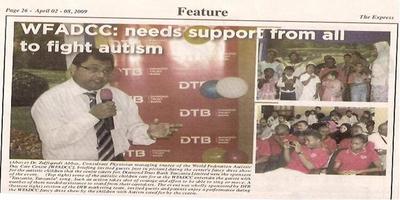Updated 20 April 2009
The World Federation’s Autistic Day Care Centre celebrated World Autism Day in April 2009. The following articles about this event were featured in the local newspapers in Dar es Salaam, Tanzania:
There’s no escaping fight against autism
The Guardian, April 2009
A centre devoted exclusively to caring for children with autism is crying out for support, saying demand for its services outstrips their capacity by far. This is the three-year-old Dar es Salaam based World Federation Autistic Day Care Centre (WFADCC), and it was this last Saturday that it spoke about the challenges it has been facing.
The occasion was a memorable parents’ visiting day, which was appropriately coloured by a Fancy Dress Show where children with the medical condition were the main players.
These are times when most people’s attention is often automatically drawn to overtly deadly or debilitating diseases like malaria, cancer, diabetes, tuberculosis and Aids, while “less violent” ones to go virtually unnoticed.
Experts describe autism as a complex set of neurobiological disorders which typically last throughout a person’s lifetime but which, despite the life-long plight of the victims, fall under the second category. This is most unfortunate because early professional intervention can expose the victims to a normal development process.
Consultant physician Zulfikar G. Abbas, WFADCC’s managing trustee, aptly underscores the need for society to chip in and help mitigate the havoc that autism can cause on children and the larger society. He used Saturday’s event to hail all those who have been extending assistance to the rare centre.
Autism disrupts social and communication skills, implying an impaired ability to read, move around and manage various other social cues. Its incidence in the US is approximately one out of every 150.
It is also reported that 67 children are diagnosed every day, that a new case is diagnosed almost every 20 minutes, that more children will be diagnosed with autism this year than with aids, diabetes and cancer combined, and that autism is the fastest growing serious developmental disability in the US costing the nation over $35 billion a year.
As if these statistics are not gloomy enough, we are told that there is no medical detection or cure for autism and that the condition receives less than 5% of the research funding of many less prevalent childhood diseases.
It is hard to say how much light last Saturday’s event shed on autism, a disability usually beginning before three years of age. But an upbeat Dr. Abbas says that, although there is no single cause or cure for the condition, people with autism can be helped into leading a normal life span, and it might also be a blessing in disguise that the condition occurs in all countries and within all socioeconomic classes.
Children at Dar es Salaam’s WFADCC have special needs and face a range of difficulties relating to day to day social skills, communication, behaviours, imagination, sensory perception and learning. The disability facing them is a nightmare to many parents and guardians and is the lot of many other Tanzanians who would equally benefit from the services of similar centres.
Since only focused and selfless community action could serve as an adequately effective intervention, we must all make that intervention forthcoming because no one can tell who, when, where and how autism will next strike.

To view/download World Autism Day article by Timothy Kitundu, click here
For more information, please email health@world-federation.org